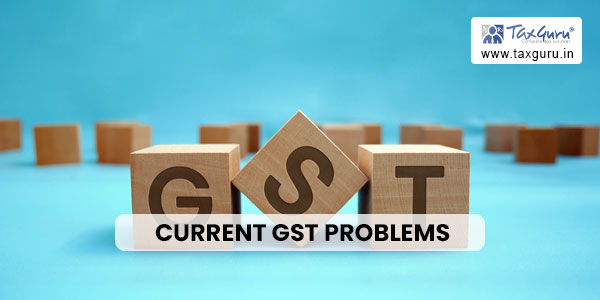Introduction: Goods and Services Tax (GST) in India aimed to streamline tax collection and enhance compliance. However, the current system suffers from multiple glitches that are both harsh and unjust for the tax-paying community. This article sheds light on some pressing concerns, such as Section 16(4), Reverse Charge Mechanism (RCM), high penalty rates, and more, offering a path toward effective solutions.
Also Read: जीएसटी डीलरों के लिए चुनौतियाँ और समाधान: मुख्य समस्याएँ
1. SECTION 16(4): – HARSH PROVISION!!!
Section 16(4) is a very harsh and unjustified provision of the GST Law and it is tantamount to Double Taxation. Once the Purchaser has paid tax to the seller and it is available in his GSTR-2A/2B but the input credit of the same is denied to the purchaser if he failed to claim the ITC on or before a certain date as mentioned in Section 16(4) , even though the Government has already received the Tax on it. Even in the Normal circumstances, the provision is very harsh but see how this provision affected the Amnesty scheme provided by the Governmetn for the benefit of the Government. See here the worst effect of this provision below: –

“An amnesty scheme was introduced in GST under which the dealers who were left out from filing returns due to any reason, were given the facility to file returns belated with nominal/reduced late fees but till then the date of taking input credit which is given in section 16(4) of GST law had expired. Now the period for the input credit claim made by these dealers has passed under Section 16(4), therefore, considering it as non-available, demands are being made to deposit it along with interest.”
If this were to happen, then such amnesty scheme would be of no benefit and moreover, cancellation of input credit in this manner amounts to double taxation which is also against natural justice as the government has already received which is deposited by the dealer to his seller and by the seller to the government.
Hence Keeping in view the practical side of this problem, relief should be provided to such dealers and further this artificial restriction of 16(4) should be abolished for normal dealers also.
2. RCM: – REVERSE CHARGE MECANISM: – NOW IT IS A DOUBLE TAXATION
“If a dealer has paid RCM and if eligible, he will get the ITC of the same in the same Month hence in most of the cases it has no Financial Effect.”
The tax paid under RCM i.e. Reverse Charge Mechanism is such a tax in most of the taxable cases that if the dealer had paid it on time, then his input credit would have been available at the same time and if the dealer had not paid it on time, then the dealer would have got the ITC. In case of Late payment of RCM after a specified time the dealer did not even get his input credit of the same. In these situations the dealer has already paid his dues tax in other ways i.e. through cash or through ITC. Not paying the ITC in this way is just a procedural error but due to this mistake now this type of dealer has to pay this tax and interest and such demands are in lakhs and now his input credit will also not be available. A very harsh and unjustified situation.
This type of problem especially involves mine owners paying the dead rent and royalty and dealers who are unable to pay the RCM on Services taken from GTA.
Keeping in mind the practical aspect of this problem, relief should be provided to such dealers for paying again the Tax which they have already paid to the Government.
3.MINIMUM PENALTY IS TOO HIGH
Under GST, if a dealer receives a Show cause notice and is unable to deposit it within 30 days, even such a small demand, then he has to pay a minimum penalty of Rs 20,000.00 (SGST 10000.00+ CGST 10000.00).
Let us try to understand it through an example. Suppose there was a demand of only Rs 100.00 state tax and Rs 100.00 central tax, but due to lack of knowledge/information the dealer could not deposit it within 30 days with DRC-03, then his penalty became Rs 20000.00 as mentioned above. Relief should be given to the dealers affected by penalties more than taxes and interest. The penalty amount should not be more than the Amount of Tax.
4. PURCHASER IS RESPONSIBLE FOR THE ACT OF SELLER!!!!: – HOW HE CAN CONTROL THE PROCEDURAL ACTIVITIES OF SELLER?
If the buyer has paid the tax and purchased the goods from the seller but the seller has not filed his return on time, then whatever may be the financial burden of his failure, it is imposed on the buyer by restricting his input credit. It is not practical because it is in not in the hands of the buyer to control the procedural activities of the seller.
There is no power with the Purchaser to compel the seller to deposit the tax on time and file the return as per law and further the Government does not ask the buyer for details of his purchases, it is not even known at the Government departmental level on which sales the seller has not paid tax. It is a very strange situation.
In this entire process, only the innocent buyer gets punished for every procedural mistake of the seller and this is an impossible and impractical law which should be made practical and whatever punishment is given to the guilty dealer, he should be given to the seller who is not paying the tax or not filing the return within scheduled time.
5. PENALTY IS GREATER THAN TAX!!!!!
If a dealer receives a notice under GST and is unable to deposit even a small demand stipulated time, then he has to pay a minimum of Rs 20000.00 as penalty!!!!!! Let us try to understand it through an example. Suppose there was a demand of only Rs 100.00 state tax and Rs 100.00 central tax, but due to lack of information the dealer could not deposit it within 30 days and fill DRC-03, then his penalty became Rs 20000.00. In this way, relief should be given to the dealers affected by penalties more than taxes and interest.
6. DEALER HAS PAID TAX BUT INTEREST IS GOING ON!!!!!
Even when a dealer deposits tax in the bank, he has to pay interest on it until he files his return GSTR-3B. This does not happen in any tax system. In Income Tax also, interest stops from the date of deposit of tax in the bank and the same thing happened in VAT applicable earlier. If the dealer deposits the tax on time but due to some reason he files the return late, then it is not appropriate to charge interest on the tax deposited on it, so it should be rationalized by making appropriate changes in the procedure and law in this regard.
Simply a faulty and rule and System has been made since inception hence the tax payer community is suffering but the system and rules can be rectified and converted into logically user-friendly law.
7. SET OFF OF SGST/CGST AGAINST IGST: – IMBALANCE!!!!!
As per rules made under GST law, if there is any tax to be paid under IGST and if input credit is available with a dealer under both State and Central (SGST & CGST) then CGST has to be eliminated first before using any ITC from SGST. After Zero balance in CGST, the dealer can take credit of SGST. In this way the dealer does not have his own right to set off the input credit as per his optimum utility and this artificial restriction is against the very nature of GST. The result is that the dealer retains the credit of SGST but the credit of CGST gets exhausted and if after that the dealer makes sales in the state, he has to pay CGST even though he has a lot of credit in SGST. In this way, tax has to be paid separately in cash even though the amount is lying in the tax credit ledger, which affects the working capital of the dealer. Such unreasonable restrictions are minimizing the basic nature of GST and its benefits to trade and industry.
Here also there is a need to rationalize the law so that in this way the working capital and the interest charged on it can be saved. It is just a procedural problem which can be solved.
8. NO REFUND FOR SERVICES ITC IN CASE OF INVERTED DUTY REFUND!!! WHY? WHAT IS THE LOGIC!!!!!!
There is a provision attached to the refund coming through inverted duty refund that it does not get refund of input credit related to services, which is a provision that keeps a huge amount of refund deposited with the government. There is no logic behind this provision, so there is a need for change in this law in this respect.
9. INTEREST RATE 18% – TOO HIGH!!!!
Interest has to be paid on late payment of tax in GST and its rate is 18 percent which is much higher than the bank rate. Late payment of tax is not always done with an intention to save or evade tax but at most of the time it is a commercial compulsion. This rate of interest should be reduced and fixed by increasing it by 2 or 4 percent from the bank interest rate. The rate of 18 percent was fixed when the bank interest rate was 12 percent, now the bank interest rate has come down a lot, so this 18 percent rate should be reduced a bit now.
9. RETROSPECTIVE CANCELLATION OF SELLER’S RC: – HOW PURCHASER CAN BE PUNISHED!!!!
GST dealer buys goods from another GST dealer, makes payment to him, seller also filed his return and this purchases and linked to it also comes in GSTR-2A/GSTR-2B of the buyer. Now, due to any reason, the registration of the seller is canceled from the previous date, then the buyer’s input credit is canceled and he is demanded to deposit this amount along with interest. Against this, many honorable High Courts have decided in favor of tax payers. The government should end this dilemma by issuing a clear circular or clarification in this regard.
Conclusion: The Goods and Services Tax was designed to simplify the tax structure in India, but the current regulations often do more harm than good. The government should urgently address these issues to make the tax system more equitable and logical. Such an overhaul would not only benefit the tax-paying community but would also increase compliance, thereby augmenting revenue collection.





